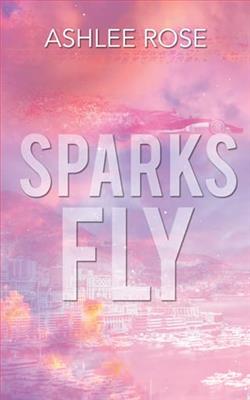Page 54 of Nantucket Gala
She let the words drop between them. She searched Francis’s face for fear.
But then, he began to bellow with laughter again. Sophia’s stomach twisted.
“You’re fiery, Sophia. It’s what I always loved about you.”
Sophia hated to be diminished to something loveable. She tore her hands away from him and put them in fists at her sides. Around them spun the Hollywood elite, people with fat checkbooks eager to throw their money at the next Francis Bianchi production. They would be terribly disappointed when they figured out thatThe Brutal Horizonwas his final good film.
What was keeping her from coming forward with the truth? She knew nobody would believe her. She knew that she lived in a man’s world, a world of sexism and belittling wives, and she wasn’t sure how to undo thousands of years of that kind of mentality, so she shook with the horror of it.
Of course, she could always send her scripts to agents and try to make it on her own. But nearly every female writer or director she’d known in the business had given up. Even Cindy Saucer, that sensational film director who’d made the World War II flickback in ’77, had given up. And Sophia and Natalie had both been sure that Cindy would make it one day.
Who decided who got to make it? Who decided who sneaked through?
“You can’t dictate who I see and when I see them,” Francis growled, turning menacing. “You don’t know what I’m capable of. You don’t know what I’ve already done.”
Sophia was taken aback.
Suddenly, she was reminded of that night a year and a half ago. It was the same night Dean Chatterly had been reported as missing.
Francis had been out all day. And when he’d come home, his face was streaked with blood, and his shirt was torn. It looked as though he’d been in a major fight. When she doted on him, asking him what had happened, he said he’d been jumped in Hollywood, that they’d tried to take his wallet, but he’d outrun them. Sophia had believed him.
But then she’d seen the news. She’d seen that Dean Chatterly had gone missing. She’d seen that he’d been found—murdered.
And of course, she’d thought of Francis. She’d thought of his bloody state.
But the minute she’d wondered if her husband was a murderer, the minute she’d shoved the thought into the back alleys of her mind. Francis was my greatest love.He would never do that, she’d thought.
And now, now that she was fully aware of Natalie, of their relationship, of the power Natalie had over her life, Sophia understood. All the pieces were falling into place.
“I never had to convince you to let Natalie audition,” she whispered. “You’ve been having an affair for years.”
Francis’s smile opened into a hollow laugh. “There she is,” he taunted her. “The brilliant writer Sophia Bianchi. Nothing gets past her!” He grabbed a flute of champagne from a passingserver and brought it to his lips. Sophia tried to knock it from his grasp, but he evaded her.
“I’m calling you a car,” he barked over his shoulder, disappearing into the crowd.
Sophia wavered. Her stomach spasmed with cramps. Her thoughts swarmed.
And then, out of the corner of her eye, Sophia spotted Natalie. She was hovering near the bar, wringing her hands and watching Sophia. Her eyes were lined with red. From her expression, she now understood that Sophia had figured it all out. Sophia cut through the crowd, storming up to her, ready to make a scene. But as she approached, she was swarmed with images of 1977—when she and Natalie had met. In her mind’s eye, she watched them sharing a beer at a local bar because they hadn’t had enough money to buy two. They walked along Santa Monica Pier, chatting about the divine futures they so wanted, futures that had still seemed possible at the time. Her heart ached at the memories. Her heart ached at the horror and hatred she now felt for Francis.
Now, Sophia stood a few inches from Natalie and swallowed, swallowed, as her gut roiled with anger.
“How could you?” she rasped.
Natalie put her face in her hands. “Sophia,” she whispered. “I—”
But Sophia didn’t want to wait around for a limp apology. Raising her skirt, she tore past the bar and out toward the beach, where a boardwalk stretched over the bluffs. Out here, the wind was ominous, and thick black clouds rushed toward the dark horizon. Not a single star was out. Sophia’s hair whipped back and forth and filled her mouth. Still, she wept. She wanted to throw herself in the ocean. She didn’t want to wake up tomorrow.
It was the worst she’d ever felt.
“Sophia!” It was Natalie, struggling through the wind to get to her. “Sophia, let me explain!”
At the top of a massive stairway that led down to the beach below, Sophia staggered to a halt. With her right hand, she gripped the railing and let the wind bring her dangerously close to where the staircase dropped. She imagined her heels giving out on her. She imagined planting face-first on the cement block at the bottom.
Suddenly, Natalie was there at the top of the stairs. But whoever had designed the staircase had only allowed for one railing. Sophia had that railing. She wasn’t giving it up. Natalie didn’t seem to notice. She put her hands on her hips and then let them fall as tears drifted down her cheeks. If Sophia wasn’t mistaken, she thought it was about to rain.
“You aren’t going to win, Natalie,” Sophia called over the howling wind.
“I got carried away. I did. It won’t happen again,” Natalie cried.















